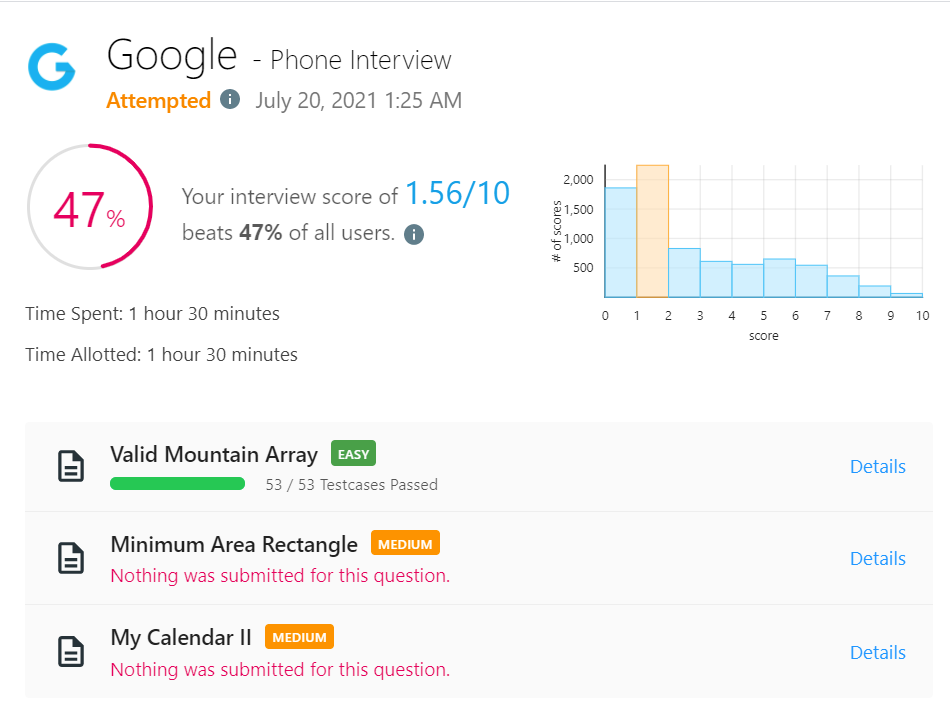
941. Valid Mountain Array
class Solution {
public boolean validMountainArray(int[] arr) {
if (arr.length < 3) {
return false;
}
boolean decreasing = false;
int prev = arr[0];
if (arr[0] > arr[1]) {
return false;
}
for (int i = 1; i < arr.length; i++) {
if (! decreasing) {
if (arr[i] < prev) {
decreasing = true;
} else if (arr[i] == prev) {
return false;
}
prev = arr[i];
} else {
if (arr[i] >= prev) {
return false;
}
prev = arr[i];
}
}
if (! decreasing) {
return false;
} else {
return true;
}
}
}Runtime: 1 ms, faster than 100.00% of Java online submissions for Valid Mountain Array.
Memory Usage: 40.3 MB, less than 36.52% of Java online submissions for Valid Mountain Array.
한번이라도 줄어들면 그 이후로 커지면 false 리턴해주고
한번도 안줄어들었을 때, 한번도 안커졌을때를 위한 edge case를 잡아줬읍니다
939. Minimum Area Rectangle
3번이 풀릴랑말랑 해서 3번에 집중하느라 2번은 아예 못풀었읍니다..
class Solution {
public int minAreaRect(int[][] points) {
Set<String> hs = new HashSet<>();
for(int[] p: points)
hs.add(p[0] + "#" + p[1]);
int min = Integer.MAX_VALUE;
for(int i=0; i<points.length; i++)
{
for(int j= i+1; j<points.length; j++)
{
if(points[i][0]==points[j][0]||points[i][1]==points[j][1]) continue;
String p1 = points[i][0] + "#" + points[j][1];
String p2 = points[j][0] + "#" + points[i][1];
if(hs.contains(p1)&&hs.contains(p2))
{
int area = Math.abs((points[i][0]-points[j][0])*(points[i][1]-points[j][1]));
min = Math.min(min, area);
}
}
}
return min==Integer.MAX_VALUE?0:min;
}
}Runtime: 584 ms, faster than 19.31% of Java online submissions for Minimum Area Rectangle.
Memory Usage: 39.6 MB, less than 32.52% of Java online submissions for Minimum Area Rectangle.
쉬셋이를 만들어줘서 하나하나 선이 그어지는지 비교해서 전에 있는 것들과 합쳐서 구해지는 넓이를 구하고 전체 넓이를 Math.min로 비교해줘서 최솟값만 저장하는 방식
class MyCalendarTwo {
int[] schedule;
public MyCalendarTwo() {
schedule = new int[1000000000];
}
public boolean book(int start, int end) {
boolean booked = true;
for (int i = start; i < end; i++) {
if (this.schedule[i] < 3) {
this.schedule[i]++;
} else {
booked = false;
}
}
return booked;
}
}
/**
* Your MyCalendarTwo object will be instantiated and called as such:
* MyCalendarTwo obj = new MyCalendarTwo();
* boolean param_1 = obj.book(start,end);
*/Memory Limit Exceeded
처음에는 10^9승 메모리를 만드려고 했는데 memory limit exceeded 걸렸읍니다
class MyCalendarTwo {
Map<Integer, Integer> schedule;
public MyCalendarTwo() {
schedule = new HashMap<Integer, Integer>();
}
public boolean book(int start, int end) {
boolean booked = true;
for (int i = start; i < end; i++) {
schedule.put(i, schedule.getOrDefault(i, 0) + 1);
if (schedule.get(i) >= 3) {
booked = false;
}
}
if (!booked) {
for (int j = start; j < end; j++) {
schedule.put(j, schedule.get(j) - 1);
}
}
return booked;
}
}
/**
* Your MyCalendarTwo object will be instantiated and called as such:
* MyCalendarTwo obj = new MyCalendarTwo();
* boolean param_1 = obj.book(start,end);
*/Time Limit Exceeded
67 / 97 test cases passed.
그래서 쉬셋이로 돌아왔는데..
이번에는 time limit exceeded^^
class MyCalendarTwo {
Map<int[], Integer> schedule;
public MyCalendarTwo() {
schedule = new HashMap<int[], Integer>();
}
public boolean book(int start, int end) {
for (int i = start; i < end; i++) {
int prev = 0;
for (int[] times : schedule.keySet()) {
if (i < times[1] && i >= times[0]) {
prev += schedule.get(times);
}
if (prev >= 2) {
return false;
}
}
}
int[] cur = new int[2];
cur[0] = start;
cur[1] = end;
schedule.put(cur, schedule.getOrDefault(cur, 0) + 1);
return true;
}
}
/**
* Your MyCalendarTwo object will be instantiated and called as such:
* MyCalendarTwo obj = new MyCalendarTwo();
* boolean param_1 = obj.book(start,end);
*/60 / 97 test cases passed.
이게 더 빠르길 바랬는데 더 느리네요..ㅠ
이건 쉬맵이
class MyCalendarTwo {
TreeMap<Integer, Integer> delta;
public MyCalendarTwo() {
delta = new TreeMap();
}
public boolean book(int start, int end) {
delta.put(start, delta.getOrDefault(start, 0) + 1);
delta.put(end, delta.getOrDefault(end, 0) - 1);
int active = 0;
for (int d: delta.values()) {
active += d;
if (active >= 3) {
delta.put(start, delta.get(start) - 1);
delta.put(end, delta.get(end) + 1);
if (delta.get(start) == 0)
delta.remove(start);
return false;
}
}
return true;
}
}Runtime: 213 ms, faster than 38.23% of Java online submissions for My Calendar II.
Memory Usage: 39.8 MB, less than 50.23% of Java online submissions for My Calendar II.
제꺼와 걍 거의 동일한데 쉬맵이 대신에 treemap을 쓰니깐 통과됐어요......ㅎ
생각해보니깐 진짜 treemap을 쓰면 더 앞에서 잡히니깐... 더 빠른게 말이 되네요
